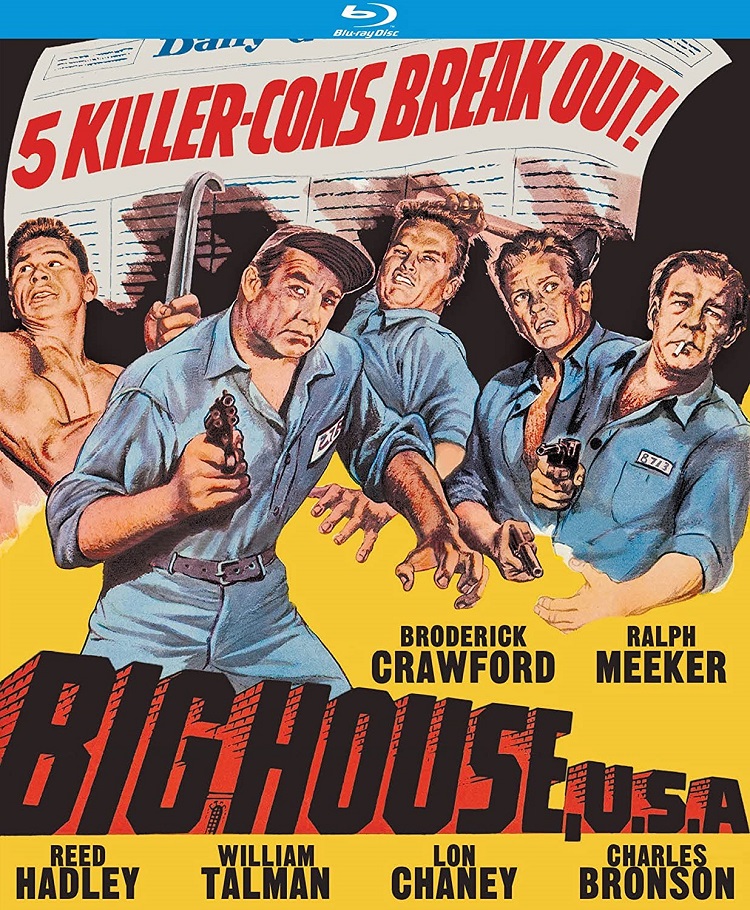
This was an unexpected treasure. Big House, U.S.A. (which is a completely undescriptive, absolutely terrible title for this grim thriller) is as close as movies came in the ’50s to being like the crime-fiction novels of the era. It’s a lumpy narrative that follows our antagonist from bad end to bad end, getting into one horrible scrape from which he can’t escape to another, without ever making him sympathetic or likeable. Doesn’t sound like a fun time at the movies, but Big House, U.S.A. is consistently engaging, taut, and interesting, and doesn’t always go just where I expected it to.
Extremely episodic, the movie plays out in broad chunks of story. We start with Danny Lambert, a little asthmatic kid terrified of getting shots, who runs away from the nurse at his summer camp in Royal Gorge to be found by Jerry Barker. Played by Ralph Meeker (who might be best known to classic noir fans as Mike Hammer in Kiss Me Deadly), Barker seems to be helping Danny, until he gets to an emergency phone in the middle of the park, and calls Danny’s rich dad to let him know his son has been kidnapped, and where to deliver the ransom.
The story cascades from there, sometimes moving in surprisingly grim directions, and at times it takes on an aspect of documentary realism, complete with a helpful narrator to describe what the authorities are doing as the hunt for Danny Lambert becomes more desperate, and the National Guard is called out.
Eventually Barker lands in prison on extortion charges. Everybody on his cell block hates him, and they start a pool to determine who is going to eventually kill him. Dubbed “The Ice Man” during his trial for his cold demeanor and lack of remorse over the still missing Danny, he’s put in a cell with a regular murderer’s row of criminals, including Lon Chaney Jr’s Alamo Smith (described by the warden as “a border killer and wetback smuggler. He’s a pretty good guy.”) and a constantly shirtless (and impressively ripped) Charles Bronson as a hothead killer. They’re all under the wing of crime planner Rollo Lamar (Broderick Crawford), who adds the Ice Man to his latest plan to escape prison: when they get out, they’ll force Barker to show them where he hid the ransom money he got paid for the kid he insists he didn’t really kidnap.
Big House, U.S.A. was directed by Howard W. Koch, who did most of his directing work in TV in the ’50s and ’60s, and might be better known as a producer, having produced as disparate classics as The Manchurian Candidate and Airplane! It isn’t the most assuredly directed or edited thriller I’ve ever seen. In a climactic scene in Royal Gorge when swaths of police are gathering to prepare to confront the escaped criminals, there’s never the real sense that they are cutting the men off – we see several shots of cops leaning behind rock and trees, holding up guns, but not enough of an established sense of location to really sell the plot point. Still, without any bravura shots or camerawork to speak of, the direction knows how to get out of its own way. There’s plenty of breathtaking vistas in Royal Gorge, shot in widescreen black and white. The image is very grainy, and thankfully there hasn’t been any “enhancement” to the picture on this Blu-ray to smooth out the grain and give it a clean video image that some may mistake for being “hi-def.”
It’s not a smooth film – the parts do not all fit together too completely. It switches from thriller to pseudo-documentary to police procedural to prison movie and back and forth. But I found it compelling throughout, and remarkably tough. I think it’s a mistake to label any black and white crime movie a film noir. Film noir really refers to a specific time period, and has a less specific but generally recognizable character arc, where an ostensibly good man (or woman) indulges the negative side of their nature and catch hell for it. There’s also the undercurrent in most film noir about WWII, where men come back from a world of violence into “peaceful” America, and maybe cannot cope. This is not that, but it borrows from film noir some of the frankness about human nature. The bad guys in this film are bad, and don’t buy any of the nonsense about honor amongst thieves. And it’s not sensationalized, or sentimentalized. Big House, U.S.A. is just a tough, mean crime drama. I wish there were more just like it.